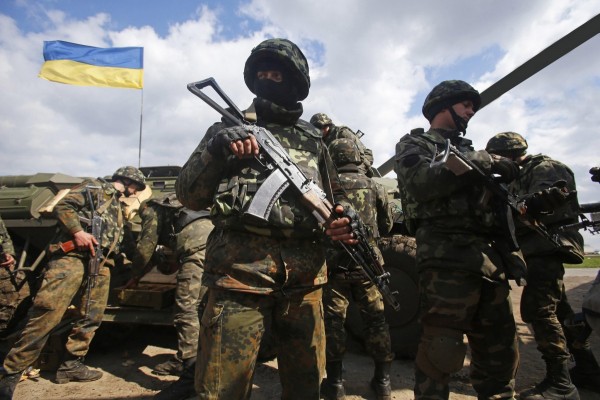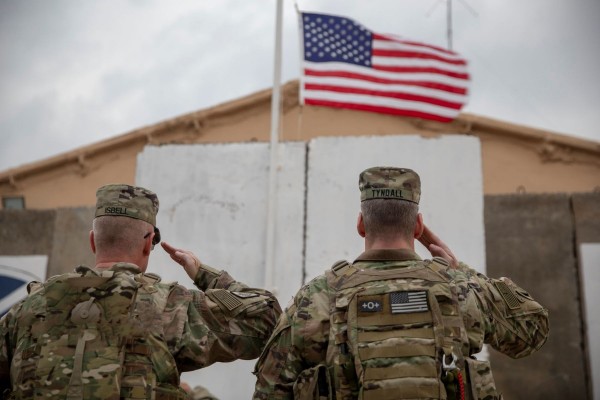Ukraine: How to avoid escalation and end the war
The main goal must be to facilitate peace in Ukraine with a view to maintaining shared security in wider Europe and beyond

Ukrainian servicemen taking part in combat training, February 12, 2022. Photo courtesy the Press Service of the General Staff of the Armed Forces of Ukraine
As Russian tanks roll across Ukrainian soil, Vladimir Putin’s seemingly ill-advised full-scale invasion of his neighbour now threatens to drag on for months or even years. Pundits and analysts across Western media outlets claim Russia’s push towards Kyiv has stalled, and that a litany of strategic errors have annulled any hopes of a quick victory. But the question remains: how long can Ukraine hold out?
While the Ukrainians have staunchly defied predictions of imminent collapse, Russian forces continue to cut off supply routes and surround the country’s major cities. The United States and Ukraine’s Western allies, meanwhile, have stated and re-stated their position of military non-involvement in the conflict, opting instead to provide the government of President Volodymyr Zelensky with copious amounts of lethal aid, including anti-tank weapons and Stinger missile systems, to stave off an increasingly brutal Russian advance. The US has furnished more than $1 billion to help Ukraine’s military over the past year alone.
US Secretary of State Antony Blinken says he believes Ukraine can eventually prevail over Russia, but with some hawks calling for the establishment of a no-fly zone over the country, and louder talk of funding an insurgency inside of Ukraine, it appears the US and its allies have failed to learn from their past mistakes.
Current efforts to prevent Russia from escalating its assault on Ukraine are based on strategies that have resulted in disaster in Afghanistan, Syria and elsewhere, and should be viewed as highly provocative in three related areas: political rhetoric, the ongoing financial war, and unchecked military support for Kyiv. Experts now assess that the possibility of a wider conflict between Russia and NATO is no longer unthinkable, even if one is touched off inadvertently.
In its rhetoric, Western leaders, particularly US President Joe Biden, have stressed threats and accusations over dialogue and communication. As a result, they have limited the spectrum of options available to influence the Kremlin. With Putin determined to end the war with Ukraine on Russia’s terms, the duplicity of the US approach has come into sharp focus: if the West is unwilling to “close the skies” over Ukraine and deploy NATO aircraft to block Russia from using its air force in support of its invasion (a move that would invite nuclear war), the surge in military assistance and weapons for Ukraine promises to prolong the suffering of civilians and is likely to have many unintended negative consequences.
The White House continues to insist that dialogue and negotiation cannot begin until Putin withdraws his troops from Ukraine, yet this is highly unlikely to happen. On Sunday, March 6, in a meeting with French President Emmanuel Macron, Putin reiterated unequivocally that Russia will achieve its objectives in Ukraine either through “negotiation or war.”
As became clear in the weeks leading up to Russia’s invasion, US officials were obstinate and ultimately intractable in their rejection of Russian demands against NATO expanding to Ukraine and Georgia. The inability to compromise on other issues including the placement of intermediate-range missiles and NATO military exercises, crippled the possibility of future negotiations that could have addressed any of Russia’s concerns and potentially staved off an attack.
In the words of Zeeshan Aleem, “the fact that the NATO status question was not put on the table as Putin signaled that he was serious about an invasion—so plainly that the US government was spelling it out with day-by-day updates—was an error, and potentially a catastrophic one… compromise on Ukraine’s future entry into NATO would have required admitting the limitations of Western power.” He continues:
The U.S. must do everything it can do to end this war—which is already brutalizing Ukraine, rattling the global economy, and could quite easily spiral into a nuclear-armed confrontation between the US and Russia, if things get out of hand—as swiftly as possible, including negotiating on Ukraine’s NATO status and possible neutrality with an open mind. And over the longer term, Americans must realize that in an increasingly multipolar world, reckoning with the limits of their power is critical for achieving a more peaceful and just world.
The Biden administration seemingly understands the importance of direct communication, but it has decided not to lose face or show weakness in its approach to Putin. This negligent strategic posture has only encouraged Russia’s militarism while harming Biden’s already declining political standing at home in advance of the upcoming midterm elections.
On the economic front, Western policies constitute nothing short of full-fledged economic warfare with all the available options already implemented or currently on the table, including an energy embargo and the complete financial isolation of the Russian economy. Such policy deprives the West of any leverage in facilitating a political solution, emboldening Putin to complete his “special military operation.” According to the Quincy Institute’s Marcus Stanley, sanctions are flawed if they are designed as “open-ended and long term, aimed at provoking regime change in Russia rather than linked to a diplomatic process to end the war in Ukraine.”
Moscow’s military aggression has polarized public opinion within Russia, but polls suggest Putin has enjoyed a slight uptick in support since the invasion (although these must be viewed with some skepticism). Meanwhile, the political rhetoric coming out of Washington has often veered into hysteria, as measured by Senator Lindsey Graham, who tweeted “the only way this ends is for somebody in Russia to take this guy out,” referring to Putin.
Is there a Brutus in Russia? Is there a more successful Colonel Stauffenberg in the Russian military?
— Lindsey Graham (@LindseyGrahamSC) March 4, 2022
The only way this ends is for somebody in Russia to take this guy out.
You would be doing your country - and the world - a great service.
The limits to US power and influence are evident in other areas, too. As the Washington Post reported, the US and its allies are quietly preparing for a Ukrainian government-in-exile and a long insurgency within the war-ravaged country. This comes after reports released last month revealing the Central Intelligence Agency has been preparing for the likelihood of a Russian occupation. According to investigative reporting by Yahoo News, the CIA established a covert program after Russia’s invasion and annexation of Crimea in 2014 to train and advise Ukrainian special forces and intelligence officers at a secret facility in the US. According to a senior intelligence official quoted in the story:
If the Russians invade, those [graduates of the CIA programs] are going to be your militia, your insurgent leaders… We’ve been training these guys now for eight years. They’re really good fighters. That’s where the agency’s program could have a serious impact.
According to historian Jeff Rogg, CIA involvement will likely end in failure, giving Russia an “even better pretext to target the general population.” He concludes that an insurgency will result in “immense civilian suffering” while bolstering Russian propaganda claims and recklessly prolonging the conflict.
Moreover, these preparations for the possibility of a Russian invasion may help to explain why Biden and other leaders are now encouraging or turning a blind eye to a rising influx of Western mercenaries travelling to fight in Ukraine.
Attempts by the West to increase the supply of military aid to Ukraine is another factor threatening to exponentially heighten the level of risk to civilians and ignite a protracted proxy war, scuttling any chance of reaching a compromise or settlement between Moscow and Kyiv. Thus far, Western attempts are working to prolong the conflict and worsen the humanitarian crisis while not principally changing the outcome of the war on the ground. The balance of power in the battle remains heavily tilted against Kyiv. Military experts claim that Russian troops have been advancing and that the bulk of the military has yet to enter the fight.
Long thread about how I think the first 96 hours have gone, still very early/incomplete impressions. The initial Russian operation was premised on terrible assumptions about Ukraine’s ability & will to fight, and an unworkable concept of operations. Moscow badly miscalculated. 1/
— Michael Kofman (@KofmanMichael) February 28, 2022
Writing in Consortium News, Craig Murray, former British ambassador to Uzbekistan, predicted “massive Ukrainian deaths” while “NATO leadership will strike heroic poses, wave Ukrainian flags and send more weapons.”
Such tragic developments are still avoidable. If a settlement is to be found, the White House should urgently restore high-level dialogue with the Kremlin. The main goal must be to facilitate peace in Ukraine with a view to maintaining shared security in wider Europe and beyond—not simply to punish or isolate Putin and engage in full-scale financial war with Russia.
To move in this direction, the US could create an opening for a compromise by removing some sanctions, stressing its responsibility for global security, and calling on the Russian leadership for dialogue without preconditions. Such steps may help to avert further escalation in the short run while laying the ground for a more robust political settlement in the weeks and months to come.
Andrei P. Tsygankov is a Professor of International Relations and Political Science at San Francisco State University, and author of Russia and America: The Asymmetric Rivalry (Polity Press, 2019). His forthcoming book is Russian Realism: Defending ‘Derzhava’ in International Relations.










